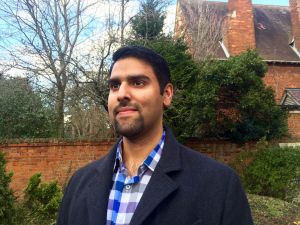The Muslim convert to Christianity who is emerging as one of the world’s leading experts on Islam has issued a chilling warning of the fundamental violence within the faith.
Nabeel Qureshi, whose book Seeking Allah, Finding Jesus became a New York Times best seller, believes the world is in the midst of an Islamic reformation. This means a return to the religion’s fundamentals, he told Christian Today, and there is no doubt that these fundamentals are explicitly violent.
Qureshi told Christian Today: “There is a basis to believe in Jesus. He rose from the dead. You can check that historically. You don’t have to believe it on blind faith. The Koran says if you believe Jesus is God, you will go to hell. (ch 5:72) whereas Romans (10:9) tells us we need to believe that to be saved. So they are exactly contrary. Therefore you cannot be both Christian and Muslim.”
He warned that Muslims today have just three choices – to become nominal, to become apostate, which in Islam is punishable by death, or to embrace the fundamentals of the faith and become radical. Many are opting for the latter, he said.
“A reformation is going back to the original form. This is an Islamic reformation we are seeing.”
To counter jihad, “we have to figure out what we are dealing with – to figure out what Islam is,” he added.
This weekend he is speaking at the ‘Unshakeable’ conference at the East London Tabernacle in Mile End, east London, alongside Andy Bannister, director of Razi Zacharias International Ministries Canada and Jo Vitale, lecturer at the Oxford Centre for Christian Apologetics. The conference is designed as a counter to pressure to water down the teachings of Christ in order to fit in with what is deemed by “society” to be acceptable.
His next book, Answering Jihad, written in response to the Paris attacks, is out soon.
Qureshi, aged 32, said the book came out of a need for an explanation of the relationship of Islam to jihad.
Since 9/11, there have been strong arguments made that Islam is a religion of peace. Then there were the Paris attacks, then San Bernardino in the US. “People didn’t know how to respond,” said Qureshi. This led to the comments about banning Muslims from the US by Republican candidate Donald Trump, and other controversies such as the removal of a professor at Wheaton College who claimed Muslims and Christians worship the same God. “Few people are answering the theological questions beneath these realities,” said Qureshi. The debate was polarised between people saying Islam is a religion of peace and those arguing it is inherently violent. “I thought we needed better way forward.”
As a young man, he tried and failed to convert a close Christian friend to Islam.
“On 9/11 I was a Muslim. I was facing the stark reality of violence in Islam,” he recalls. He was 18 years old, and the attacks on the Twin Towers inspired him to investigate the life of Mohammed.

“What I concluded was violence is present not only in the history of Mohammed’s life but it is present as a crescendo. Mohammed moves from peaceful to violent to extraordinarily violent at the time of his death. He was a pacifist who moved into self defence, then into limited offence and then more or less unlimited offence by the time of his death.”
The Koran describes this, he said. It is not arranged chronologically but can be aligned to show how this happens. “The last chronological chapter of the Koran, chapter nine, is the most violent, with verses such as slay infidelds wherever you find them, besiege them and make them captive. These are very violent passages.”
So the question then becomes, who is a good Muslim and what is good Islam, Qureshi said.
“To the extent to which Islam focus on its foundational texts we can expect the outcome to be very violent. But you do have legitimate systems of tradition that move Muslims away from foundational texts through centuries of accreted tradition.” There are also progressive Muslim scholars who are actively trying to recontextualise Islam for modern times.
But Qureshi is pessimistic about their chances. “I don’t think they will be successful because of the internet, because people have access to these texts. They can just go to the internet and read them and see how violent Mohammed was and how violent the Koran is.”
Qureshi explained that when a Muslim is confronted with the reality of the foundational texts they reach a three-pronged fork in the road. “One path is apostasy – to leave. Another path is apathy. The last path is radicalisation. That’s how they become radicalised.”
He said violence is pervasive in the traditional sources. “The moment you look at a book on Hadith or Mohammed’s life from original sources, they are rank with violence. There is no way around it.” At first he tried to cherry pick. “Then I realised they permeated the tradition and there was no way I could take a razor and separate violent Islam from peaceful Islam.”
Qureshi is formidably bright. He has qualified as a doctor, has a degree in Christian apologetics and a masters in religion. He also worked for a time as an itinerate preacher. He is now studying at Oxford, doing an MPhil in Judaism and Christianity at Christ Church and aims to progress onto a doctorate.
He became a follower of Christ in 2005, when he was 22.
“I did receive death threats. Within a month of becoming a Christian, someone left a note on my car. The vast majority of death threats are from people online, they are just people letting off steam. I’ve been told now to let people know when it happens. Before I just blocked and moved on.”
He conceded that he could have become a nominal Muslim, had it not been for a friend of his who was presenting compelling case for Christianity at the same time.
He is convinced by the verifiable truth of the Christian faith. “You cannot provide a basis for Islam to be the truth”
However, when his parents found out he had accepted Christ, it was not easy.
“To become a Christian is not an individual matter as it is in the West. In Middle Eastern societies your life is social; you are part of a community. What you do tremendously impacts the people around you. My mother was a daughter of Muslim missionary. Her whole life was predicated towards service to Islam. Now her only son had became a Christian. It brings tremendous shame not just to my reputation but to her, the name of her father and grandfather.”
At first they could not believe it, he admitted, as he had been devout. Relationships were difficult for a time but he is married now, with a young daughter, and things have improved.
“Christ has revolutionised my life. As Muslim I was raised to be moral, to consider others and be kind. But once you see that God himself lowers himself such that he becomes a servant of others, willing to die for them, you realise that the supreme ethic is self-sacrifice out of love.
“There’s nothing like that in Islam or any other world view. A lot of religions tell you to be kind to others, but the reality is you end up emulating your god. If your god is money your whole life will become about money. The Christian God is eternal selfless love.”
Combine that with salvation through Christ’s work. “If you know salvation is in God’s hands then you can truly live. We can live such that even if we have to die for others, we can. Only the Gospel truly allows us to live.”
He has seen too much to have doubts, he says. “The only people that truly doubt a supernatural reality are people born and raised in the sheltered West.”
http://www.christiantoday.com/
 Hướng Đi Ministries
Hướng Đi Ministries





